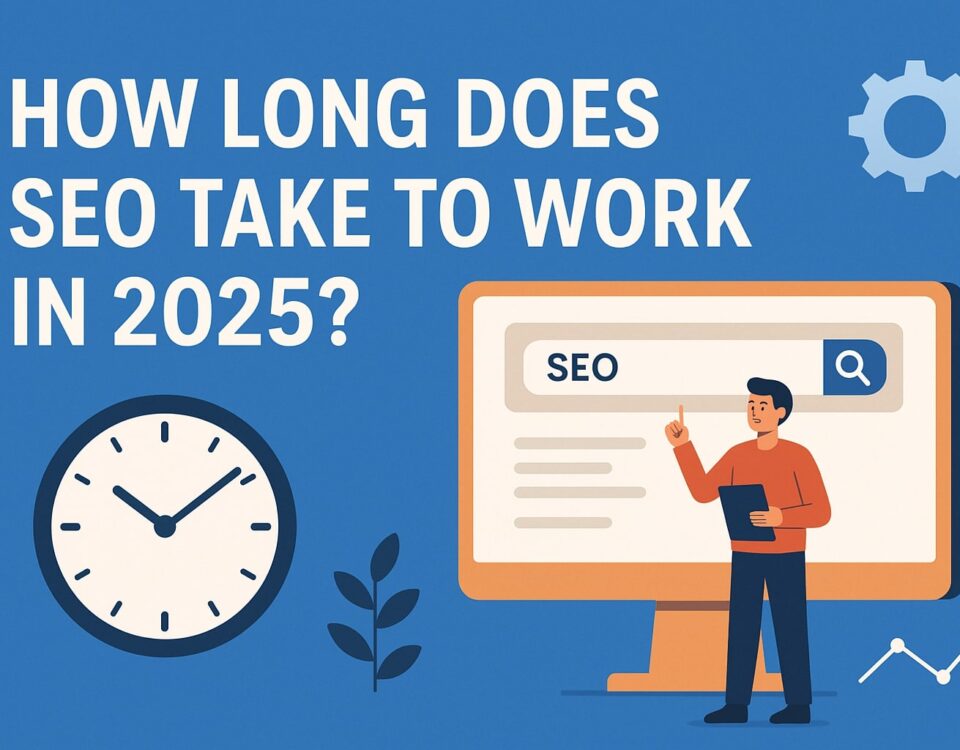
How Can Local SEO Help My Business Get More Walk-In Customers?
July 25, 2025
How Long Does SEO Take to Work in 2025?
August 29, 2025What Are High-Quality Backlinks and How Do They Boost Google Rankings?
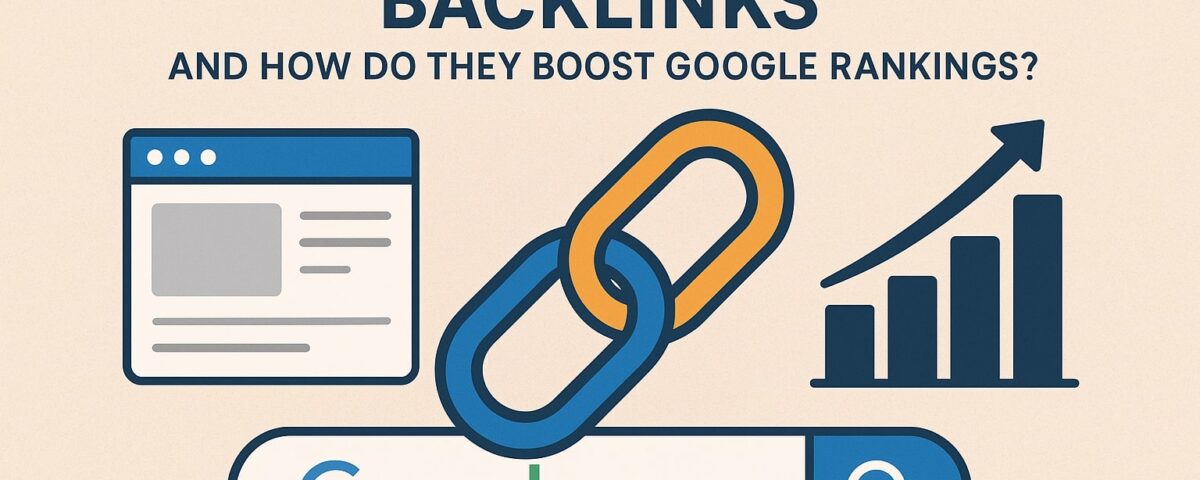
Why Backlinks Still Matter in 2025
Search engine optimization (SEO) is constantly evolving, but one thing hasn’t changed over the years—High-Quality Backlinksremain one of the most powerful ranking factors. If you’ve been researching how to improve your Google rankings, you’ve probably heard that backlinks are like votes of confidence from other websites. But here’s the catch: not all backlinks are created equal.
Think of it like this: if a stranger vouches for you, it may not hold much weight. But if a respected industry leader endorses you, suddenly your credibility skyrockets. The same principle applies in SEO. Google sees backlinks as recommendations, but only the high-quality ones can truly move the needle for your rankings.
In 2025, Google’s algorithms have gotten smarter than ever. Gone are the days when you could stuff your site with spammy links and trick the system. Today, quality outweighs quantity. A single link from a trusted, authoritative site can be far more powerful than hundreds of low-quality links.
This article dives deep into what makes a backlink high-quality, why they’re so crucial for SEO, and how they can directly impact your business growth. By the end, you’ll not only understand why backlinks are still the backbone of Google rankings, but also how to strategically earn them—especially through professional link-building services like those we provide at Robust SEO Services.
What Are High-Quality Backlinks?
Backlinks, also known as inbound links, are links from one website that point to another. In SEO terms, they act like digital referrals. When another website links to your content, it’s essentially telling Google: “This page is trustworthy and valuable.”
But here’s the critical part—not all backlinks carry equal weight. Some can help your site rise to the top of search results, while others can drag your rankings down or even trigger penalties. That’s why understanding the difference between high-quality and low-quality backlinks is key.
Defining Backlinks in SEO Terms
A backlink is simply a hyperlink placed on an external site that leads users to your website. For example, if a well-known marketing blog cites your content and includes a clickable link to your site, you’ve gained a backlink.
Google views these backlinks as part of its “off-page SEO” signals. The more authoritative and relevant sites linking to you, the more credible your site appears in Google’s eyes.
The Difference Between High-Quality and Low-Quality Links
Not all links are created with good intentions. While high-quality backlinks come from trusted, relevant, and authoritative websites, low-quality backlinks often come from spammy, irrelevant, or low-domain-authority sites.
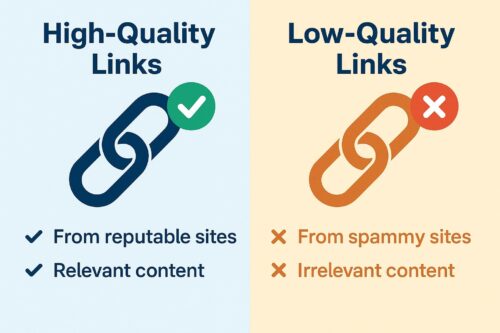
-
High-quality backlinks:
-
Come from relevant websites in your niche.
-
Are placed naturally within valuable content.
-
Originate from domains with strong authority and credibility.
-
-
Low-quality backlinks:
-
Come from shady directories, link farms, or unrelated sites.
-
Are often paid, manipulated, or automated.
-
Can trigger Google penalties if overused.
-
In short: high-quality backlinks boost your rankings; low-quality ones can hurt them. That’s why serious businesses invest in professional link-building services instead of gambling with black-hat tactics.
The Core Characteristics of High-Quality Backlinks
So, what exactly separates a powerful backlink from a worthless one? Google evaluates links based on multiple factors, and the strongest backlinks usually share four key characteristics.
Relevance to Your Industry
A backlink has more impact when it comes from a website related to your field. For example, if you run a digital marketing agency, a link from an authoritative SEO blog is far more valuable than one from a random cooking site.
Relevance ensures that the backlink looks natural and aligns with your niche. Google’s algorithm is sophisticated enough to determine topical relevance, so links from unrelated sites often carry little weight—or worse, appear manipulative.
Authority and Domain Rating
Authority is everything in SEO. Websites with high Domain Authority (DA) or Domain Rating (DR)—metrics provided by tools like Moz and Ahrefs—can pass more “SEO juice” to your site.
Think of authority like reputation. Would you rather get a recommendation from a world-renowned expert or an unknown beginner? The expert’s endorsement clearly carries more weight. Similarly, a backlink from a site like Forbes, HubSpot, or Search Engine Journal has massive value compared to a new blog with little credibility.
Natural Placement in Content
Google rewards links that appear naturally within high-quality content. Backlinks that are contextually embedded inside articles, blogs, or research papers carry more weight than those stuffed in sidebars, footers, or irrelevant pages.
For example, if your site gets mentioned in an in-depth guide where your brand is recommended as a solution, that’s a natural and highly valuable backlink. On the other hand, if your link is randomly inserted with no context, it might raise red flags.
Editorial Endorsement vs. Paid Links
The strongest backlinks are editorial, meaning they are given voluntarily by content creators because they truly find your content valuable. Paid links, guest post farms, or link exchanges can backfire if they look artificial.
Google’s algorithm is highly skilled at detecting manipulative link schemes. That’s why investing in organic, editorial backlinks is the safest and most effective long-term strategy. At Robust SEO Services, we specialize in securing exactly these kinds of links—backlinks that Google wants to reward.
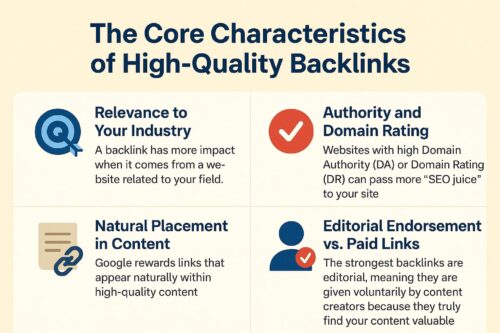
Why Google Values High-Quality Backlinks
Google’s ultimate mission is to provide users with the most relevant, trustworthy, and useful content. Backlinks help Google’s algorithm measure credibility and authority across the web.
Trustworthiness & Authority Signals
When reputable websites link to yours, it sends a clear signal to Google that your content is trustworthy. In fact, Google’s original PageRank algorithm was built around this concept—evaluating the quality and quantity of backlinks to rank pages.
Even though algorithms have evolved, backlinks remain one of the strongest trust signals. A site with authoritative backlinks is far more likely to rank higher than one without them.
User Experience and Content Validation
Google doesn’t just want to see that your content is linked—it wants to see that it’s validated by experts in your field. High-quality backlinks act as third-party confirmations that your content is valuable and reliable.
From a user’s perspective, backlinks are like road signs. If trusted sites guide them toward your website, they’re more likely to see you as a credible authority.
How Backlinks Feed Into Google’s Algorithm
Backlinks influence multiple aspects of SEO:
-
Ranking Power: High-quality backlinks help push your site toward the top of search results.
-
Crawlability: Backlinks make it easier for Google’s crawlers to discover and index your pages.
-
Contextual Relevance: Links provide context clues about your content’s subject matter, helping Google categorize your site correctly.
This is why businesses that prioritize high-quality backlinks consistently outperform competitors. Google rewards sites that earn genuine endorsements, and backlinks are the backbone of that system.
The Tangible Benefits of High-Quality Backlinks for SEO
If you’re still wondering why backlinks deserve so much attention, let’s break down the real-world benefits they bring to your business.
Higher Search Rankings
The most obvious benefit of quality backlinks is improved Google rankings. Studies consistently show that pages with more authoritative backlinks rank higher in search results.
When your site appears on the first page of Google, you’re instantly positioned in front of more potential customers. And unlike paid ads, organic rankings deliver long-term traffic without ongoing costs.
Increased Organic Traffic
More visibility leads to more clicks. High-quality backlinks drive organic traffic in two ways:
-
Referral Traffic – Users click on the backlinks themselves.
-
SEO Traffic – Higher rankings bring more visitors from Google searches.
This creates a snowball effect—the more traffic you get, the more engagement signals you send to Google, which can further boost rankings.
Stronger Brand Authority
Backlinks also elevate your brand reputation. When your site is mentioned on respected industry websites, you gain instant credibility. This not only helps with SEO but also positions your business as a trusted leader in your niche.
Think of backlinks as PR in digital form. Each mention strengthens your authority, making customers more likely to trust and choose you over competitors.
How to Identify High-Quality Backlink Opportunities
Finding high-quality backlinks isn’t about casting a wide net and hoping something sticks—it’s about being strategic. The truth is, the internet is full of opportunities, but not every site is worth pursuing. If you want backlinks that actually boost your Google rankings, you need a systematic way to identify the right sources.
One of the most effective ways to start is by analyzing your competitors. Who’s linking to them? If authoritative sites are vouching for your competitors, there’s a good chance they’ll be open to linking to your content as well—if it’s valuable and relevant. Tools like Ahrefs, SEMrush, and Moz can help you reverse-engineer competitor backlinks and spot potential opportunities.
Another tactic is to look for industry directories and niche-specific platforms that are well-respected. For example, a law firm might benefit from getting listed on authoritative legal directories, while a tech company might pursue mentions on top technology blogs.
It’s also important to evaluate sites before chasing links. Some key questions to ask:
-
Does the site have high domain authority?
-
Is it relevant to my industry?
-
Does it produce real, valuable content (not just spammy guest posts)?
-
Is the site’s traffic organic and engaged?
When you’re selective, each backlink becomes a stepping stone toward stronger rankings instead of a wasted effort. And if this process feels overwhelming, this is exactly where professional link-building services can help. At Robust SEO Services, we don’t just chase any backlink—we target the ones that will actually move the needle for your business.
Effective Strategies to Build High-Quality Backlinks
Now that we know what makes a backlink valuable, let’s talk about how to actually earn them. Building high-quality backlinks is not about shortcuts; it’s about strategy, persistence, and creativity. Here are some of the most effective approaches.
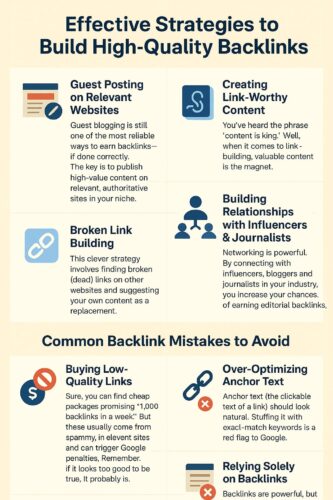
1. Guest Posting on Relevant Websites
Guest blogging is still one of the most reliable ways to earn backlinks—if done correctly. The key is to publish high-value content on relevant, authoritative sites in your niche. Avoid mass guest posting networks or low-quality sites. Instead, target blogs with engaged audiences and editorial standards.
2. Creating Link-Worthy Content
You’ve heard the phrase “content is king.” Well, when it comes to link-building, valuable content is the magnet. Some of the most link-worthy content types include:
-
Data-driven studies
-
Ultimate guides
-
Infographics
-
Case studies
-
Tools or calculators
When your content is genuinely useful, people naturally want to reference it.
3. Broken Link Building
This clever strategy involves finding broken (dead) links on other websites and suggesting your own content as a replacement. It’s a win-win: the site owner fixes a problem, and you gain a backlink.
4. Building Relationships with Influencers & Journalists
Networking is powerful. By connecting with influencers, bloggers, and journalists in your industry, you increase your chances of earning editorial backlinks. Tools like HARO (Help a Reporter Out) can also connect you with journalists looking for expert quotes.
5. Leveraging Digital PR
Public relations and SEO are merging. A strong digital PR campaign can land you backlinks from news sites, magazines, and industry leaders—which are among the most powerful links you can get.
At Robust SEO Services, we combine these strategies into custom link-building campaigns that deliver sustainable, long-term results.
Common Backlink Mistakes to Avoid
While backlinks can skyrocket your rankings, they can also hurt you if handled poorly. Many businesses fall into the trap of chasing quantity over quality—or worse, using outdated black-hat tactics. Let’s go over some of the most common mistakes.
1. Buying Low-Quality Links
Sure, you can find cheap packages promising “1,000 backlinks in a week.” But these usually come from spammy, irrelevant sites and can trigger Google penalties. Remember: if it looks too good to be true, it probably is.
2. Over-Optimizing Anchor Text
Anchor text (the clickable text of a link) should look natural. Stuffing it with exact-match keywords is a red flag to Google. A healthy backlink profile includes a mix of branded, generic, and keyword-rich anchors.
3. Ignoring Relevance
A backlink from an unrelated site may not help much—and in some cases, it may harm your credibility. Always prioritize relevance over sheer numbers.
4. Neglecting On-Site SEO
Even the best backlinks can’t save a poorly optimized website. Backlinks should complement strong on-page SEO (site speed, mobile friendliness, keyword optimization, etc.).
5. Relying Solely on Backlinks
Backlinks are powerful, but they’re only one piece of the SEO puzzle. Relying on them alone without content marketing, technical SEO, and user experience improvements can limit your results.
Avoiding these pitfalls ensures your backlink strategy actually boosts rankings instead of undermining them.
The Role of Link-Building Services in SEO Success
Now, let’s be real—building high-quality backlinks is time-consuming and labor-intensive. Researching opportunities, writing guest posts, doing outreach, and tracking results all take significant effort. This is why many businesses choose to partner with professional link-building services.
Here’s what a reliable service (like ours at Robust SEO Services) brings to the table:
-
Experience & Expertise – We know what works and what doesn’t in today’s SEO landscape.
-
Access to Networks – Established relationships with bloggers, journalists, and influencers.
-
Scalable Outreach – While you focus on your business, we handle the legwork of securing valuable links.
-
Customized Strategies – Every business is different, so cookie-cutter approaches don’t cut it.
-
Safe & White-Hat Practices – We prioritize organic, editorial links that align with Google’s guidelines.
By outsourcing link-building to experts, businesses save time, avoid costly mistakes, and achieve faster results. In fact, many of our clients see ranking improvements within just a few months of consistent link acquisition.
Case Studies: How Backlinks Transformed Rankings
Sometimes the best way to understand the power of backlinks is through real-world examples. Here are a couple of scenarios that illustrate how high-quality backlinks can dramatically change outcomes.
Case Study 1: Local Business Breakthrough
A small e-commerce brand selling eco-friendly products struggled to get noticed online. Despite having a well-designed website, their traffic was stagnant. Once we secured backlinks from sustainability blogs, green living directories, and a few digital magazines, their rankings for competitive keywords skyrocketed. Within six months, their organic traffic grew by 300%.
Case Study 2: B2B Company Gaining Authority
A B2B software company wanted to dominate search results for terms in their niche. We helped them earn backlinks from industry blogs, SaaS review sites, and business publications. Within a year, they became one of the most authoritative voices in their industry, attracting not just traffic but also high-value leads.
These examples highlight a crucial point: backlinks don’t just boost rankings—they transform businesses by driving visibility, traffic, and credibility.
Tools and Resources to Analyze Backlinks
If backlinks are the backbone of SEO, then backlink analysis tools are the X-ray machines that show you what’s really happening. Without the right tools, it’s almost impossible to know whether your links are helping, hurting, or simply doing nothing.
Some of the most powerful tools for backlink analysis include:
-
Ahrefs – Known for its massive backlink database, Ahrefs lets you track your own links, monitor competitors, and identify new opportunities. You can see referring domains, anchor text, domain authority, and whether links are do-follow or no-follow.
-
SEMrush – Great for competitor analysis, SEMrush provides insights into backlink profiles, toxic link warnings, and outreach opportunities.
-
Moz Link Explorer – This tool specializes in domain authority and spam score analysis, helping you weed out harmful links.
-
Majestic SEO – Offers unique metrics like Trust Flow and Citation Flow to evaluate link quality.
-
Google Search Console – A free but essential tool that shows which sites are linking to you directly from Google’s perspective.
Using these tools, you can answer critical questions like:
-
Which backlinks are driving the most traffic?
-
Do I have toxic links that need disavowing?
-
Which competitors are getting backlinks I should target too?
-
What anchor texts are most common in my profile?
By regularly auditing your backlink profile, you can fine-tune your strategy, avoid penalties, and focus on acquiring links that deliver real results. At Robust SEO Services, we rely on these tools daily to ensure our clients’ backlink strategies stay sharp and effective.
The Future of Backlinks in SEO
SEO never stays still, and backlinks are no exception. While backlinks remain a powerful ranking factor today, the way Google evaluates them is evolving rapidly. So, what does the future hold?
AI-Powered Link Evaluation
Google’s algorithms are increasingly powered by artificial intelligence. Instead of just counting links, Google now evaluates context, user intent, and semantic relevance. This means that backlinks surrounded by rich, relevant content will matter far more than isolated links.
Quality Over Quantity Will Intensify
The shift toward quality has already begun, but it’s only going to get stronger. A handful of links from respected sources could outweigh thousands of mediocre ones.
User Engagement Signals Will Blend with Backlinks
Google is focusing more on user experience metrics like dwell time, bounce rate, and CTR. Backlinks that drive genuine engagement—meaning people click them and stay on your site—will likely carry more weight in the future.
Rise of Brand Mentions
Even unlinked brand mentions (when your brand is cited without a hyperlink) are believed to be growing in importance. This suggests a future where building brand authority is just as critical as acquiring backlinks.
In short, backlinks aren’t going anywhere, but their role is shifting toward relevance, trust, and user impact. The takeaway? Focus on authentic, high-value backlinks today to future-proof your SEO.
How to Create a Sustainable Backlink Strategy
Building a sustainable backlink strategy isn’t about chasing quick wins—it’s about creating a long-term system that consistently earns quality links. Here’s how to do it:
1. Start with Strong Content
No one links to mediocre content. Invest in evergreen, useful, and shareable resources. Think ultimate guides, case studies, infographics, or tools that solve real problems.
2. Target the Right Audience
Focus on getting backlinks from sites your audience actually visits. Relevance ensures both SEO value and real referral traffic.
3. Mix Link-Building Tactics
Don’t rely on just one method. Combine guest posting, digital PR, broken link building, influencer outreach, and content marketing for a balanced profile.
4. Monitor and Maintain Your Links
Links can disappear or change over time. Regular audits help you reclaim lost backlinks and disavow harmful ones.
5. Play the Long Game
Backlink building is a marathon, not a sprint. Instead of obsessing over immediate results, focus on gradual growth. Over time, your backlink profile will compound in value, much like financial investments.
By thinking long-term, you’ll build an SEO foundation that keeps delivering results for years to come.
Why Businesses Should Invest in Professional Link-Building Services
For many businesses, backlink building sounds great in theory—but in practice, it’s overwhelming. Outreach takes time, relationships take effort, and mistakes can be costly. That’s why investing in professional link-building services often delivers the best ROI.
Here’s why:
-
Saves Time – Instead of spending months on trial and error, experts handle the process efficiently.
-
Avoids Risk – Professionals know which tactics are safe and which could land you in Google’s penalty box.
-
Provides Access – Established SEO agencies already have networks with bloggers, journalists, and industry leaders.
-
Delivers ROI – Every dollar spent on quality backlinks translates into long-term visibility and organic traffic.
At Robust SEO Services, we’ve helped countless businesses climb Google rankings by focusing on ethical, high-impact backlinks. Whether you’re a startup or a large enterprise, professional link-building is one of the smartest investments you can make for your online growth.
Conclusion
Backlinks aren’t just another SEO buzzword—they’re the currency of trust and authority on the internet. In 2025, high-quality backlinks remain one of the most powerful ways to boost Google rankings, drive organic traffic, and build long-term brand authority.
But remember: it’s not about chasing every link you can find. The real magic happens when you focus on quality, relevance, and sustainability. Whether you’re creating link-worthy content, doing smart outreach, or partnering with a professional service, each backlink you earn is a stepping stone to stronger visibility.
So, if you’re serious about outranking competitors and dominating your niche, it’s time to make high-quality backlinks a top priority. And if you need a trusted partner to guide you through the process, our team at Robust SEO Services is here to help you achieve exactly that.
FAQs
1. What is the difference between do-follow and no-follow backlinks?
Do-follow links pass SEO value (or “link juice”) to your site, while no-follow links do not. However, no-follow links can still bring referral traffic and brand visibility.
2. Can I rank on Google without backlinks?
It’s possible for very low-competition keywords, but for most niches, backlinks are essential to break into the first page of results.
3. How many backlinks do I need to rank?
There’s no magic number. It depends on your competition, industry, and the quality of links. A few high-authority backlinks often outperform hundreds of low-quality ones.
4. How long does it take for backlinks to improve rankings?
Typically, you can start seeing results within 3–6 months, depending on how competitive your niche is and how consistently you acquire quality links.
5. Are backlinks still important in 2025?
Absolutely. While SEO has evolved, backlinks remain one of Google’s strongest ranking factors—especially when they’re relevant, authoritative, and organic.

